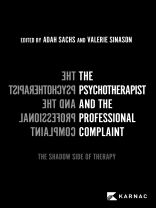This outstanding book is an update on where the mental health profession’s complaints system is now. Its timely analysis follows in the wake of prior work on reform, which include the attempt in 2001 at the House of Lords to statutorily regulate psychotherapists in the UK. (Alderdice/Casement et al.) – Professor Ann Casement, LP, Past-Chair UKCP
The patient’s word was once easily dismissed against the word of the psychiatrist, doctor or therapist, leaving the patient vulnerable. Recognising this inherent risk in the relationship between clinicians and patients, professional regulations have gradually been established to facilitate patients’ access to information, support and recourse. However, while most professions also explicitly protect their own members, there are, notably, no systems in place to protect psychotherapists. The current complaint procedure presumes the therapist’s guilt until proven innocent, rather than the reverse.
The Psychotherapist and the Professional Complaint explores this problem with sensitivity and rigour. In these chapters, the contributors examine ways to address serious conflicts in the psychotherapy relationship and the role of professional bodies in protecting their members while regulating their performance. Acknowledging both strengths and flaws, they outline the historical context and future prospects of the current complaint procedures. This book invites us to think and speak on the controversial subject of complaints, supporting patients, therapists and policymakers alike.
Cuprins
CONTENTS
ABOUT THE AUTHORS
ACKNOWLEDGEMENTS
A NOTE FROM THE EDITORS
INTRODUCTION by Adah Sachs and Valerie Sinason
PART 1: CLINICAL PERSPECTIVE
1. The psychotherapist, the profession and the professional complaint
Adah Sachs
2. When healing is halted by fear
Fiona Farley
3. Love and hate in the time of Covid: who will watch the watchmen?
Anne Kearns
4. A constructive way of dealing with conflict
Kay Beaumont
5. Complaints in the field of dissociative disorders: six key categories
Valerie Sinason
PART II: HISTORICAL PERSPECTIVE
6. Filing psychoanalytical complaints: from verbal assaults to
the crushing of the larynx
Brett Kahr
7. Reflections on a 25-year-old professional complaint
Leslie Ironside
8. Then and now – a historical perspective 113
Emerald Davis in an interview with Valerie Sinason
PART III: TOWARDS THE FUTURE
9. The unique nature of boundaries in psychoanalytic therapy
and the implication for ethics and complaints procedures
Philip Stokoe
10. Complaints and incident procedures in the NHS
Romanie Nedergaard-Couchman and Rajnish Attavar
11. Uses, misuses and abuses of fitness to practise processes
Philip Cox
12. The Psychotherapy and Counselling Union: therapists supporting
therapists through complaints processes – emergent learning
and new possibilities for regulatory change
Philip Cox, Richard Bagnall-Oakeley and Sasha Kaplin
13. Reform
Julie Norris and Andrew Campbell-Tiech
REFERENCES
INDEX
Despre autor
.
Valerie Sinason is an internationally published poet, writer, child psychotherapist, adult psychoanalyst, and lecturer. She is a former consultant psychotherapist at the Tavistock Clinic, President of the Institute of Psychotherapy and Disability (IPD), Founder and Patron of the Clinic for Dissociative Studies (CDS), and currently serves on the board of the ISSTD.












